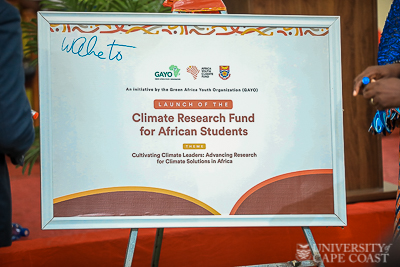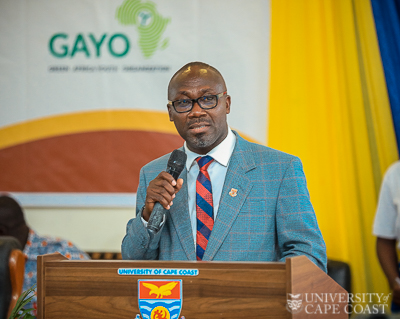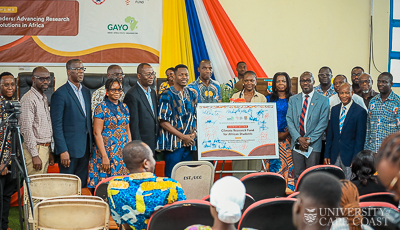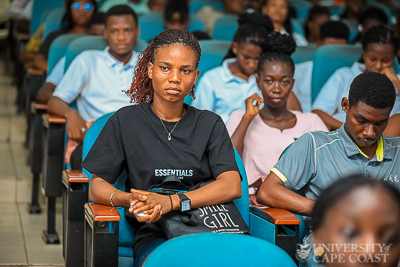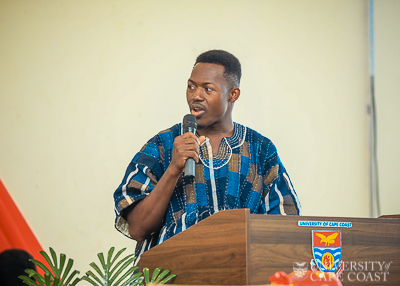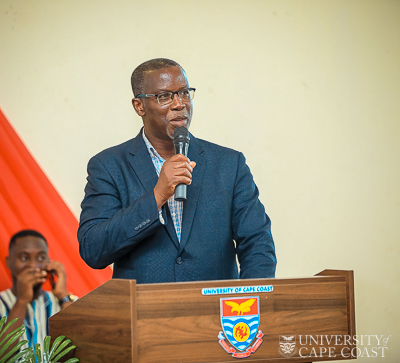The Green Africa Youth Organization (GAYO) has launched the Climate Research Fund for African Students at the University of Cape Coast (UCC).
This is a significant step toward empowering young researchers with the resources needed to address Africa’s most pressing environmental and climate challenges.
In addition to providing funding for impactful, student-led research, the programme also offers critical capacity-building opportunities,expert mentorship, and access to global knowledge-sharing platforms.
In this light, beneficiaries will connect with policymakers, academics, and international stakeholders to maximize the reach and effectiveness of their research.
Through the Climate Research Fund, GAYO seeks to drive youth-led local innovation in Africa and create lasting solutions for the continent’s vulnerable communities.
Professor Denis Aheto speaking at the ceremony
At the launch at Auditorium 900, the Pro Vice-Chancellor, Professor Denis Aheto, described the fund as both “timely and essential” for African students to conduct research, develop innovative solutions, and become leaders in the fight against climate change.
He expressed excitement that UCC was pioneering the Fund and indicated that it was an important step to empower young researchers to drive climate resilience and innovation across Africa.
Prof. Aheto said the unveiling of the Climate Research Fund for African students would also facilitate the development of sustainable solutions to mitigate and adapt to climate change and promote interdisciplinary collaboration among students from various academic backgrounds.
“I am excited about the potential impact of this initiative and the role that our students and faculty members will play in shaping the future of our planet,” he continued.
Some members of GAYO and staff members of UCC after the launch
Prof. Aheto admitted that the world was facing unprecedented environmental challenges such as rising temperatures, devastating natural disasters and unpredictable weather patterns, rising sea levels that threaten the foundation of societies.
He challenged stakeholders to take bold action to mitigate these effects and ensure a sustainable future for generations.
“The Climate Change Research Fund for African students is therefore a critical step in this direction. Ghana has climate-sensitive sectors, namely, agriculture, forestry, marine and coastal economies, other inland water resources among others and therefore the need to take climate actions,” Prof. Aheto added.
Some students at the launch
According to him, the UCC had been involved in research, teaching and outreach in relevant areas to mitigate the impact of climate change.
“For instance, in response to climate change and food security, the School of Biological Sciences through the Department of Molecular Biology and Biotechnology used molecular breeding techniques to develop climate-smart and drought-tolerant cowpeas as well as striga-resistant cowpeas to mitigate production losses.
A Co-Founder of GAYO, Mr. Desmond Alugnoa, addressing the launch
For his part, a Co-Founder of GAYO, Mr. Desmond Alugnoa, said through this initiative, his NGO was drawing attention to the fundamental gap and providing an opportunity for the youth to reimagine the possibility of becoming knowledge bearers, innovators, and inventors in the green transition”.
He added that the program will kick off with a pilot phase at the University of Cape Coast, which would serve as the foundation for a broader expansion across Africa.
“This initiative is a reflection of GAYO’s dedication to empowering the next generation of climate leaders in Africa while staying committed to locally-led solutions,” Mr. Alugnoa indicated.
Prof. Moses Joojo Eghan
The Provost of the College of Agriculture and Natural Sciences, Prof. Moses Joojo Eghan, commended GAYO for the initiative and said climate change had become part of the world and, therefore, there was a need to take action to mitigate its effect.
He challenged UCC students to take advantage of the Fund to embark on rigorous research in climate change.
Source: Documentation and Information Section

